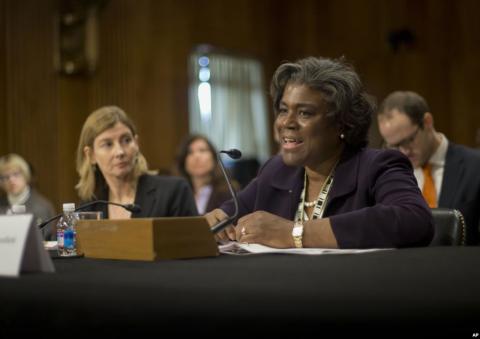
Civil society groups have expressed concern that Jonathan will use the levers of government to manipulate the election results, which could unleash sectarian strife as seen in previous Nigeria elections.
The United States called on Nigerian politicians recently to refrain from incendiary activities heading into the hotly contested 2015 presidential elections, which many observers fear could unleash a fresh wave of violence in Africa's largest democracy. The story was reported by AlterNet in a piece circulated widely on the Internet.

"The world is watching Nigeria," Linda Thomas-Greenfield, assistant U.S. Secretary of State in the Bureau of African Affairs, said at a forum where she offered U.S. assistance in training security forces ahead of the February 2015 poll.
"Nigeria must do everything in its power to ensure that elections are not just fair but peaceful," she said.
Provocative words and signals from the top can easily trigger violence in a country where unemployment and poverty are high, corruption goes unchecked and many people feel marginalized and disenfranchised, she added.
The country already faces an Islamist insurgency led by Boko Haram in the north and a fragile accord with armed rebels in the oil-rich Niger delta. For President Goodluck Jonathan, the stakes are high.
He is rumored to be seeking a second full term and for the first time since the 1998 return to civilian rule, his ruling party confronts an organised opposition that has a credible chance of unseating him.
Civil society groups have expressed concern that Jonathan will use the levers of government to manipulate the election results, which could unleash sectarian strife as seen in previous Nigeria elections. Even after the 2011 vote, which was viewed as well-managed, more than 800 people died and 65,000 people were displaced when the challenger contested the results.
Groups attending the Center for Strategic and International Studies forum cited a range of factors that heighten the risks of violence this time around: poverty, desperation and high youth unemployment make for a ready pool of recruits for vigilante groups paid for and armed by disgruntled politicians.
Mistrust is running high between the federal government and states, especially after the government's slow response to the kidnapping of 270 schoolgirls.
Schisms are opening up within the ruling party, and the election reform bill has not yet been passed, providing no certainty about how the election will be conducted.